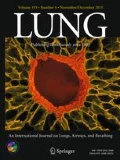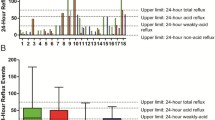Abstract
Along with upper airway cough syndrome (formerly, postnasal drip syndrome) and eosinophilic airway inflammation (asthma, nonasthmatic eosinophilic bronchitis), gastroesophageal reflux disease (GERD) is generally considered among the most common etiologies of chronic cough. Indeed, cough management guidelines published by numerous respiratory societies worldwide recommend evaluation and treatment of GERD as an integral component of the diagnostic/therapeutic algorithm for the management of chronic cough. However, a significant number of patients with chronic cough presumed due to GERD do not report improvement despite aggressive acid-suppressive therapy. Some of these refractory cases may be due to the recently appreciated entity of nonacid or weakly acidic reflux. Further contributing to the controversy are recent studies that demonstrate that patients with chronic cough do not have excessive reflux events relative to healthy volunteers. Although a temporal relationship between cough and reflux events has been suggested by studies utilizing impedance-pH monitoring of reflux events and objective cough recording, consensus is lacking in terms of whether this temporal relationship proves a causal link between reflux and cough. The fourth American Cough Conference (New York, June 2013) provided an ideal forum for the debate of this issue between two internationally recognized experts in the field of reflux and chronic cough.

Similar content being viewed by others
References
Irwin RS (2006) Chronic cough due to gastroesophageal reflux disease: ACCP evidence-based clinical practice guidelines. Chest 129(1):80S–94S
Morice AH, Fontana GA, Sovijarvi ARA, Pistolesi M, Chung KF, Widdicombe J et al (2004) The diagnosis and management of chronic cough. Eur Respir J 24:481–492
Chang AB, Lasserson TJ, Gaffney J, Connor FL, Garske LA (2011) Gastro-oesophageal reflux treatment for prolonged nonspecific cough in children and adults. Cochrane Database Syst Rev 1:CD004823
Faruqi S, Molyneux ID, Fathi H, Wright C, Thompson R, Morice AH (2011) Chronic cough and esomeprazole: a double-blind placebo-controlled parallel study. Respirology 16:1150–1156
Shaheen NJ, Crockett SD, Bright SD, Madanick RD, Buckmire R, Couch M et al (2011) Randomised clinical trial: high-dose acid suppression for chronic cough—a double-blind, placebo-controlled study. Aliment Pharmacol Ther 33:225–234
Irwin RS, Zawacki JK, Wilson MM, French CT, Callery MP (2002) Chronic cough due to gastroesophageal reflux disease: failure to resolve despite total/near-total elimination of esophageal acid. Chest 121:1132–1140
Poe RH, Kallay MC (2003) Chronic cough and gastroesophageal reflux disease: experience with specific therapy for diagnosis and treatment. Chest 123:679–684
Vakil N, Veldhuyzen van Zanten S, Kahrilas P et al (2006) The Montreal definition and classification of gastro-esophageal reflux disease (GERD)—a global evidence-based consensus. Am J Gastroenterol 101:1900–1920
Locke GR 3rd, Talley NJ, Fett SL, Zinsmeister AR, Melton LJ 3rd (1997) Prevalence and clinical spectrum of gastro-oesophageal reflux: a population-based study in Olmsted County, Minnesota. Gastroenterology 112:1448–1456
El-Serag HB, Sonnenberg A (1997) Comorbid occurrence of laryngeal or pulmonary disease with esophagitis in United States military veterans. Gastroenterology 113:755–760
Gislason T, Janson C, Vermeire P et al (2002) Respiratory symptoms and nocturnal gastro-esophageal reflux: a population based study of young adults in three European countries. Chest 121:158–163
Sackett DL, Straus SE, Richardson WS et al (2000) Evidence-based medicine: how to practice and teach EBM, 2nd edn. Churchill Livingstone, Edinburgh
Ing AJ, Ngu MC, Breslin AB (1994) Pathogenesis of chronic persistent cough associated with gastroesophageal reflux. Am J Respir Crit Care Med 149:160–167
Irwin RS, French CL, Curley FJ et al (1993) Chronic cough due to gastroesophageal reflux. Clinical, diagnostic, and pathogenetic aspects. Chest 104:1511–1517
Dicpinigaitis PV (2003) Short- and long-term reproducibility of capsaicin cough challenge testing. Pulm Pharmacol Ther 16:61–65
Javorkova N, Varechova S, Pecova R et al (2008) Acidification of the oesophagus acutely increases the cough sensitivity in patients with gastro-oesophageal reflux and chronic cough. Neurogastroenterol Motil 20:119–124
Vaezi MF, Hicks DM, Abelson TI et al (2003) Laryngeal signs and symptoms and gastroesophageal reflux disease (GERD): a critical assessment of cause and effect association. Clin Gastroenterol Hepatol 1:333–344
Irwin RS, Ownbey R, Cagle PT et al (2006) Interpreting the histopathology of chronic cough: a prospective, controlled, comparative study. Chest 130:362–370
Patterson N, Mainie I, Rafferty G et al (2009) Nonacid reflux episodes reaching the pharynx are important factors associated with cough. J Clin Gastroenterol 43:414–419
Oelschlager BK, Quiroga E, Isch JA, Cuenca-Abente F (2006) Gastroesophageal and pharyngeal reflux detection using impedance and 24-h pH monitoring in asymptomatic subjects: defining the normal environment. J Gastrointest Surg 10:54–62
Decalmer S, Stovold R, Houghton LA et al (2012) Chronic cough: relationship between microaspiration, gastroesophageal reflux, and cough frequency. Chest 142:958–964
Bohman JK, Kor DJ, Kashyap R, Gajic O, Festic E, He Z, Lee AS (2013) Airway pepsin levels in otherwise healthy surgical patients receiving general anesthesia with endotracheal intubation. Chest 143:1407–1413
Kahrilas PJ (2008) When proton pump inhibitors fail (editorial). Clin Gastroenterol Hepatol 6:482–483
Ing AJ, Ngu MC, Breslin AB (1991) Chronic persistent cough and gastro-oesophageal reflux. Thorax 46:479–483
Ours TM, Kavuru MS, Schilz RJ et al (1999) A prospective evaluation of esophageal testing and a double-blind, randomized study of omeprazole in a diagnostic and therapeutic algorithm for chronic cough. Am J Gastroenterol 94:3131–3138
Paterson WG, Murat BW (1994) Combined ambulatory esophageal manometry and dual-probe pH-metry in evaluation of patients with chronic unexplained cough. Dig Dis Sci 39:1117–1125
Blondeau K, Dupont LJ, Mertens V et al (2007) Improved diagnosis of gastro-oesophageal reflux in patients with unexplained chronic cough. Aliment Pharmacol Ther 25:723–732
Sifrim D, Dupont L, Blondeau K et al (2005) Weakly acidic reflux in patients with chronic unexplained cough during 24 hour pressure, pH, and impedance monitoring. Gut 54:449–454
Bogte A, Bredenoord AJ, Smout AJ (2008) Diagnostic yield of oesophageal pH monitoring in patients with chronic unexplained cough. Scand J Gastroenterol 43:13–19
Smith JA, Decalmer S, Kelsall A et al (2010) Acoustic cough-reflux associations in chronic cough: potential triggers and mechanisms. Gastroenterology 139:754–762
Kunsch S, Gross V, Neesse A et al (2011) Combined lung-sound and reflux-monitoring: a pilot study of a novel approach to detect nocturnal respiratory symptoms in gastro-oesophageal reflux disease. Aliment Pharmacol Ther 33:592–600
Chang AB, Lasserson TJ, Kiljander TO et al (2006) Systematic review and meta-analysis of randomised controlled trials of gastro-oesophageal reflux interventions for chronic cough associated with gastro-oesophageal reflux. BMJ 332:11–17
Chang AB, Lasserson TJ, Gaffney J, Connor FL, Garske LA (2006) Gastro-oesophageal reflux treatment for prolonged non-specific cough in children and adults. Cochrane Database Syst Rev 4:CD004823
Kahrilas PJ, Howden CW, Hughes N et al (2013) Response of chronic cough to acid-suppressive therapy in patients with gastroesophageal reflux disease. Chest 143:605–612
Kiljander TO, Salomaa ER, Hietanen EK, Terho EO (2000) Chronic cough and gastro-oesophageal reflux: a double-blind placebo-controlled study with omeprazole. Eur Respir J 16:633–638
Noordzij JP, Khidr A, Evans BA et al (2001) Evaluation of omeprazole in the treatment of reflux laryngitis: a prospective, placebo-controlled, randomized, double-blind study. Laryngoscope 111:2147–2151
Ing AJ, Ngu MC, Breslin ABX (1992) A randomised double blind placebo controlled cross-over study of ranitidine in patients with chronic persistent cough (CPC) associated with gastroesophageal reflux (GOR) [abstract]. Am Rev Resp Dis 145(4 pt 2):A11
Vaezi MF, Richter JE, Stasney CR et al (2006) Treatment of chronic posterior laryngitis with esomeprazole. Laryngoscope 116:254–260
Francis DO, Goutte M, Slaughter JC et al (2011) Traditional reflux parameters and not impedance monitoring predict outcome after fundoplication in extraesophageal reflux. Laryngoscope 121:1902–1909
Allen CJ, Anvari M (1998) Gastro-oesophageal reflux related cough and its response to laparoscopic fundoplication. Thorax 53:963–968
Allen CJ, Anvari M (2002) Preoperative symptom evaluation and esophageal acid infusion predict response to laparoscopic Nissen fundoplication in gastroesophageal reflux patients who present with cough. Surg Endosc 16:1037–1041
Brouwer R, Kiroff GK (2003) Improvement of respiratory symptoms following laparoscopic Nissen fundoplication. ANZ J Surg 73:189–193
Ziora D, Jarosz W, Dzielicki J et al (2005) Citric acid cough threshold in patients with gastroesophageal reflux disease rises after laparoscopic fundoplication. Chest 128:2458–2464
So JB, Zeitels SM, Rattner DW (1998) Outcomes of atypical symptoms attributed to gastro-esophageal reflux treated by laparoscopic fundoplication. Surgery 124:28–32
Faruqi S, Sedman P, Jackson W, Molyneux I, Morice AH (2012) Fundoplication in chronic intractable cough. Cough 8:3
Hoppo T, Komatsu Y, Jobe BA (2013) Antireflux surgery in patients with chronic cough and abnormal proximal exposure as measured by hypopharyngeal multichannel intraluminal impedance. JAMA Surg 148:608–615
Trinick R, Johnston N, Dalzell AM, McNamara PS (2012) Reflux aspiration in children with neurodisability—a significant problem, but can we measure it? J Pediatr Surg 47:291–298
Grabowski M, Kasran A, Seys S, Pauwels A, Medrala W, Dupont L, Panaszek B, Bullens D (2011) Pepsin and bile acids in induced sputum of chronic cough patients. Respir Med 105:1257–1261
Pauwels A, Decraene A, Blondeau K, Mertens V, Farre R, Proesmans M, Van Bleyenbergh P, Sifrim D, Dupont LJ (2012) Bile acids in sputum and increased airway inflammation in patients with cystic fibrosis. Chest 141:1568–1574
Zerbib F, Roman S, Bruley Des Varannes S, Gourcerol G, Coffin B, Ropert A, Lepicard P, Mion F (2013) Normal values of pharyngeal and esophageal twenty-four-hour ph impedance in individuals on and off therapy and interobserver reproducibility. Clin Gastroenterol Hepatol 11:366–372
Kawamura O, Shimoyama Y, Hosaka H, Kuribayashi S, Maeda M, Nagoshi A, Zai H, Kusano M (2011) Increase of weakly acidic gas esophagopharyngeal reflux (epr) and swallowing-induced acidic/weakly acidic epr in patients with chronic cough responding to proton pump inhibitors. Neurogastroenterol Motil 23(411–418):e172
Ummarino D, Vandermeulen L, Roosens B, Urbain D, Hauser B, Vandenplas Y (2013) Gastroesophageal reflux evaluation in patients affected by chronic cough: restech versus multichannel intraluminal impedance/ph metry. Laryngoscope 123:980–984
Becker V, Graf S, Schlag C, Schuster T, Feussner H, Schmid RM, Bajbouj M (2012) First agreement analysis and day-to-day comparison of pharyngeal ph monitoring with ph/impedance monitoring in patients with suspected laryngopharyngeal reflux. J Gastrointest Surg 16:1096–1101
Koch OO, Kaindlstorfer A, Antoniou SA, Asche KU, Granderath FA, Pointner R (2012) Laparoscopic nissen versus Toupet fundoplication: objective and subjective results of a prospective randomized trial. Surg Endosc 26:413–422
Galmiche JP, Hatlebakk J, Attwood S, Ell C, Fiocca R, Eklund S, Langstrom G, Lind T, Lundell L (2011) Laparoscopic antireflux surgery vs esomeprazole treatment for chronic GERD: the lotus randomized clinical trial. JAMA 305:1969–1977
Campos GM, Peters JH, DeMeester TR, Oberg S, Crookes PF, Tan S, DeMeester SR, Hagen JA, Bremner CG (1999) Multivariate analysis of factors predicting outcome after laparoscopic nissen fundoplication. J Gastrointest Surg 3:292–300
Novitsky YW, Zawacki JK, Irwin RS, French CT, Hussey VM, Callery MP (2002) Chronic cough due to gastroesophageal reflux disease: efficacy of antireflux surgery. Surg Endosc 16:567–571
Kirkby-Bott J, Jones E, Perring S, Hosking SW (2011) Proximal acid reflux treated by fundoplication predicts a good outcome for chronic cough attributable to gastro-oesophageal reflux disease. Langenbecks Arch Surg 396:167–171
Mainie I, Tutuian R, Agrawal A, Hila A, Highland KB, Adams DB, Castell DO (2005) Fundoplication eliminates chronic cough due to non-cid reflux identified by impedance pH monitoring. Thorax 60:521–523
Thoman DS, Hui TT, Spyrou M, Phillips EH (2002) Laparoscopic antireflux surgery and its effect on cough in patients with gastroesophageal reflux disease. J Gastrointest Surg 6:17–21
Conflict of interest
Dr. Kahrilas is supported by R01 DK56033 and R01 DK092217 from the Public Health Service; Dr. Smith is an inventor on a patent describing novel methods for acoustic cough detection, licensed to a medical device company with which she collaborates to develop a commercial cough monitoring system; Dr. Dicpinigaitis reports no conflicts relevant to the content of this manuscript.
Author information
Authors and Affiliations
Corresponding author
Rights and permissions
About this article
Cite this article
Kahrilas, P.J., Smith, J.A. & Dicpinigaitis, P.V. A Causal Relationship Between Cough and Gastroesophageal Reflux Disease (GERD) has been Established: A Pro/Con Debate. Lung 192, 39–46 (2014). https://doi.org/10.1007/s00408-013-9528-7
Received:
Accepted:
Published:
Issue Date:
DOI: https://doi.org/10.1007/s00408-013-9528-7




